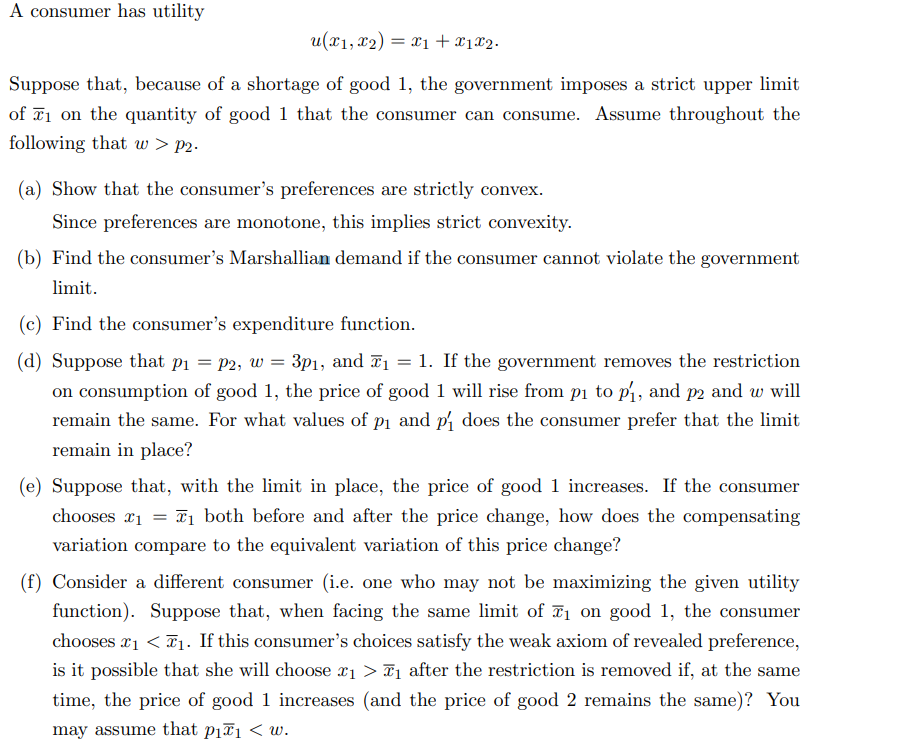A consumer has utility u(x₁, x₂) = x₁ + x1x2. Suppose that, because of a shortage of good 1, the government imposes a strict upper limit of ₁ on the quantity of good 1 that the consumer can consume. Assume throughout the following that w > p2. (a) Show that the consumer's preferences are strictly convex. Since preferences are monotone, this implies strict convexity. (b) Find the consumer's Marshallian demand if the consumer cannot violate the government limit. (c) Find the consumer's expenditure function.
A consumer has utility u(x₁, x₂) = x₁ + x1x2. Suppose that, because of a shortage of good 1, the government imposes a strict upper limit of ₁ on the quantity of good 1 that the consumer can consume. Assume throughout the following that w > p2. (a) Show that the consumer's preferences are strictly convex. Since preferences are monotone, this implies strict convexity. (b) Find the consumer's Marshallian demand if the consumer cannot violate the government limit. (c) Find the consumer's expenditure function.
Chapter4: Utility Maximization And Choice
Section: Chapter Questions
Problem 4.12P
Related questions
Question
please teach explain step by step

Transcribed Image Text:A consumer has utility
u(x₁, x₂) = x₁ + x1x2.
Suppose that, because of a shortage of good 1, the government imposes a strict upper limit
of ₁ on the quantity of good 1 that the consumer can consume. Assume throughout the
following that w > p2.
(a) Show that the consumer's preferences are strictly convex.
Since preferences are monotone, this implies strict convexity.
(b) Find the consumer's Marshallian demand if the consumer cannot violate the government
limit.
(c) Find the consumer's expenditure function.
(d) Suppose that p₁ = P2, w = 3p₁, and ₁ = 1. If the government removes the restriction
on consumption of good 1, the price of good 1 will rise from p₁ to p₁, and p2 and w will
remain the same. For what values of p₁ and p₁ does the consumer prefer that the limit
remain in place?
(e) Suppose that, with the limit in place, the price of good 1 increases. If the consumer
chooses ₁ = ₁ both before and after the price change, how does the compensating
variation compare to the equivalent variation of this price change?
£1
(f) Consider a different consumer (i.e. one who may not be maximizing the given utility
function). Suppose that, when facing the same limit of ₁ on good 1, the consumer
chooses ₁ <₁. If this consumer's choices satisfy the weak axiom of revealed preference,
is it possible that she will choose ₁ > ₁ after the restriction is removed if, at the same
time, the price of good 1 increases (and the price of good 2 remains the same)? You
may assume that p₁₁ <w.
Expert Solution
This question has been solved!
Explore an expertly crafted, step-by-step solution for a thorough understanding of key concepts.
Step by step
Solved in 4 steps

Knowledge Booster
Learn more about
Need a deep-dive on the concept behind this application? Look no further. Learn more about this topic, economics and related others by exploring similar questions and additional content below.Recommended textbooks for you

